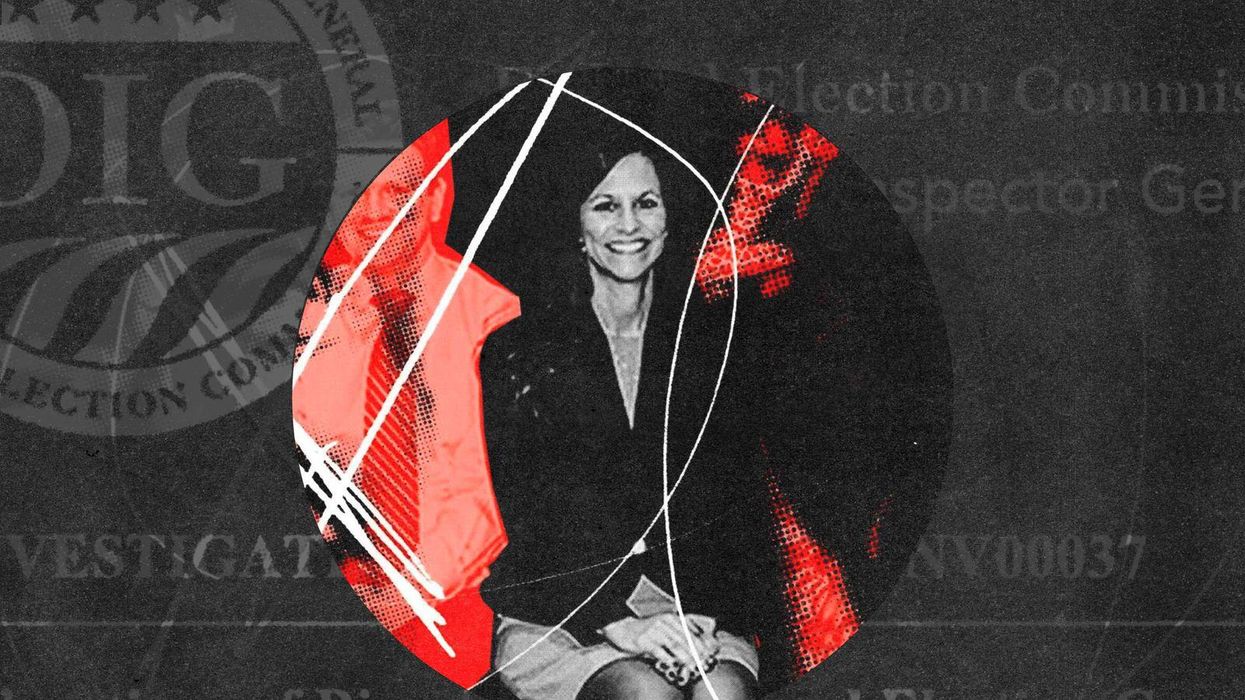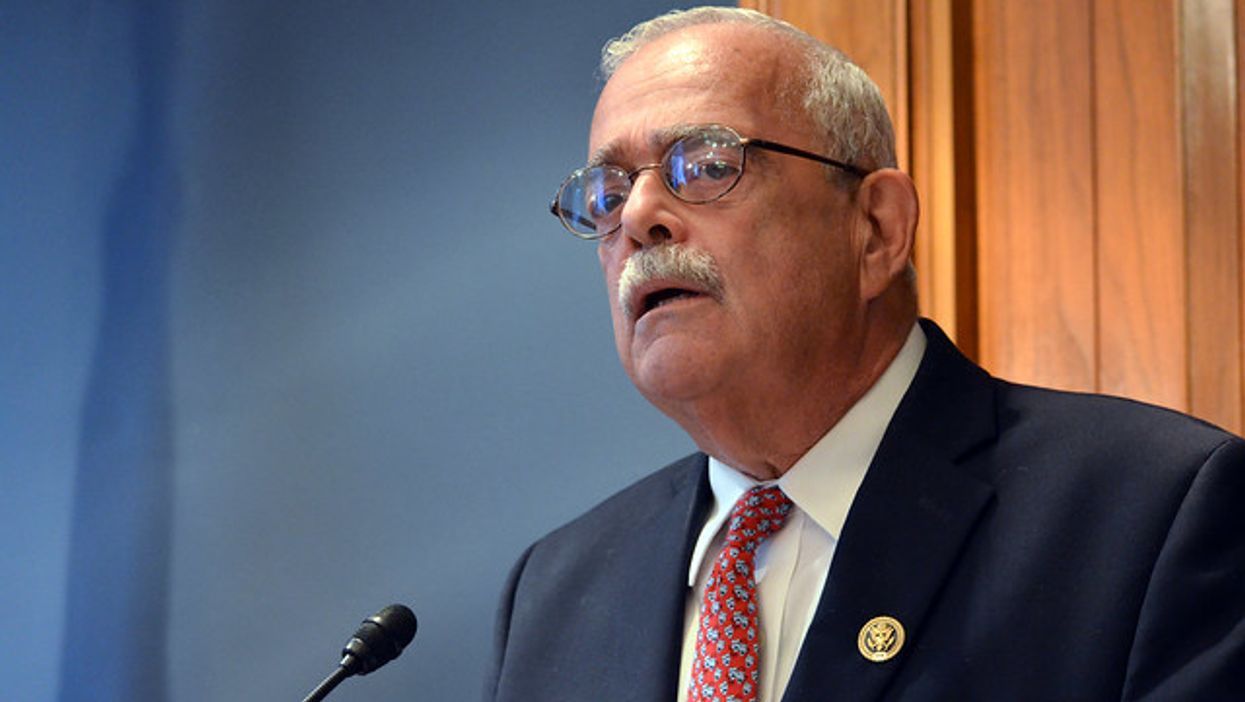The tax-exempt charity says its mission is to educate “students about the importance of fiscal responsibility, free markets, and capitalism." As its profile has risen, its revenue has ballooned, reaching $28 million, a sevenfold increase in four years.
But behind the scenes, Turning Point USA has entered into questionable financial arrangements, particularly involving Kirk's mentor, William Montgomery, the lesser-known co-founder who is credited with discovering Kirk. Montgomery, 80, an Illinois entrepreneur and onetime Tea Party activist, is one of three Turning Point insiders who have won lucrative deals from the group to handle its printing, payroll processing, and fundraising.
The nonprofit has also made misleading assertions about its finances to state and federal regulators, according to interviews and an examination of tax and business records.
Charities are required to conduct annual independent audits certifying their books are sound in order to fundraise in more than a dozen states. But the accounting firm Turning Point uses has engaged in multiple business relationships with Montgomery, who for years served as its treasurer. The dynamic, experts say, imperils independence and undermines the credibility of Turning Point's financial statements, including its federal tax returns — an issue of significance at a moment when more and more cash is flowing into the organization's coffers.
“This raises real questions about the legitimacy of the return," Philip Hackney, a University of Pittsburgh School of Law professor who formerly worked in the IRS' chief counsel's office, told ProPublica. “It makes it difficult to trust what is reported and begins to raise the possibility that it's a fraudulent statement."
The IRS requires, under the penalty of perjury, that charities attest whether they received an independent audit. Both Kirk and the co-founder have signed off on Turning Point's filings.
In response to questions from ProPublica, Sally Wagenmaker, an attorney for the nonprofit, said that payments to businesses belonging to organization officials “provided a compelling operational benefit in Turning Point's best and other interests," and that they were “in full compliance with TPUSA's IRS-compliant conflict of interest policy."
Andrew Kolvet, a Turning Point spokesman, said the business relationship between the group's auditor and its former treasurer is not significant and maintained the accounting firm is indeed an independent company. Another potential issue, ProPublica found, is that the license of the firm expired in late 2018, though the one that personally belongs to the firm's managing partner has not.
Turning Point was founded in 2012 by Kirk, then 18, and Montgomery, who invested in the young activist after hearing him speak at a small college in the state. At the 2016 Republican National Convention, Kirk met Trump Jr. and would soon accompany him on the road as an assistant. As Turning Point has thrived, Kirk's salary has grown from $27,000 to nearly $300,000, and he no longer lives with his parents — last May he bought a $855,000 two-bedroom, two-bathroom oceanfront condo in Longboat Key, Florida, county property records show.
Over the last year, the president has delivered remarks at the organization's conferences threeseparatetimes. At the group's December 2018 Mar-a-Lago affair, the president's eldest son helped it haul in nearly $5 million, tax records show. Recently, Kirk published a book called “The MAGA Doctrine," which Trump and his son promoted on Twitter.
For his part, Montgomery, whose Facebook profile picture features him posing with Trump Jr., left Turning Point last April, when, Kolvet said, his term as a board member ended. Two months later, Kirk effusively praised Montgomery in a blog post, celebrating his unmatched contributions to the nonprofit. “To anyone who has been impacted by my videos, podcast, TPUSA, our chapters, literature, events, conferences, field programs, or any speeches I have given," Kirk wrote, “you have Bill Montgomery to thank for investing in an 18-year-old with a vision — when everyone else thought it was impossible, foolish, and deemed for failure."
Montgomery, Kolvet told ProPublica, “remains a friend of the organization."
Turning Point amplifies White House messaging by regularly tweeting memes and one-liners supportive of Trump administration policies or politics to hundreds of thousands of Twitter followers, and it retweets similar messages sent by Kirk, who is followed by nearly 2 million people. Meanwhile, Kirk's and the group's tweets are often retweeted by the president, promoting the young leader's incendiary statements to more than 82 million followers, including his description of COVID-19 as the “China virus."
Kirk cultivates the image of a young, serious executive, favoring button-down shirts and sport coats in public. He revels in provoking left-leaning activists and students on everything from the Israeli-Palestinian conflict to the effects of “white privilege," which he calls a “racist lie." Turning Point promotes clips of his campus confrontations on social media, typically boasting that Kirk has “destroyed" an unworthy adversary.
Turning Point says it now has chapters on more than 2,000 campuses, 272 employees and an affiliated nonprofit largely focused on supporting Trump. Yet as the organization has expanded, it has on occasion been the center of controversy. Politico found that Turning Point has fabricated its influence on college elections. And in 2017, The New Yorker drew attention to an organizational culture that appeared plagued with racism and indifferent to laws that prohibit charities from engaging in express political advocacy. The magazine obtained text messages written by the group's former field director that said, “I HATE BLACK PEOPLE. Like fuck them all...I hate blacks. End of story." (The sender of the text resigned and Kirk told the magazine, “Turning Point assessed the situation and took decisive action within 72 hours of being made aware of the issue.")
ProPublica's examination of Turning Point's finances raises additional questions about the way the group is run, the reliability of its public disclosures and its approach to regulations governing nonprofits.
Turning Point is registered to fundraise in dozens of states across the country. Because of the group's size, attorneys general and secretaries of state in 15 states — including New York, Pennsylvania, New Mexico and Kansas — require it to file audits to remain in good standing. The work, each state's statute invariably specifies, must be carried out by “an independent certified public accountant."
The IRS does not require such an audit, but it asks about the audit's status. On Turning Point's last four federal tax returns, consistent with its state filings and spanning a period that covers July 2015 through June 2019, the group asserts that its financial statements are “audited by an independent accountant."
But Turning Point's accounting firm, the Stapleton Group, based in Orland Park, Illinois, has a significant tie to the charity. Montgomery, the charity's co-founder, has served as a “business development advisor" for Stapleton, helping to bring clients to the firm. The company's managing partner, Robert Stapleton, who handles Turning Point's returns, has worked as Montgomery's personal tax preparer, according to Stapleton. The firm, which employs a handful of people, was incorporated by the same suburban Chicago lawyer who, records show, formed a business entity Montgomery used to collect rent and make political contributions.
Robert Stapleton and the Stapleton Group did not respond directly to ProPublica. Instead, the firm provided comments through Kolvet.
Stapleton became Turning Point's auditor after Montgomery introduced the firm to the organization, a referral for which Montgomery wasn't compensated, Stapleton said through the spokesman. On his LinkedIn page and in a biography that once lived on Turning Point's website, Montgomery identifies his connection to Stapleton's firm; on the former, it states the affiliation began in 2010 and has continued to the present.
Montgomery received “no remuneration" from the firm and “acted in a business development capacity in his spare time and on commission only" in 2011, according to Stapleton. Turning Point, Kolvet said, “is confident in the independence of any services provided by The Stapleton Group."
In a statement, the firm said, “The Stapleton Group upholds the highest levels of integrity and independence while conducting audits and reviews for many businesses and organizations of all sizes."
Until the spring of last year, records show, Montgomery served on Turning Point's board and as its secretary and treasurer, giving him oversight of Turning Point's financial books and custody over its corporate records, according to the group's bylaws. At one point, he was solely responsible for fundraising and the spending of Turning Point's cash, according to charity records filed in New Mexico.
“If Montgomery has a strong relationship with the auditor, then there is a clear conflict there," said Tzachi Zach, an Ohio State University accounting professor. “Other than the auditor being hired, there should be no other relationship between the auditor and the nonprofit."
James Fishman, a former assistant attorney general in the New York attorney general's office, said that, on the question of independence, Turning Point's audit arrangement “does not pass the smell test. If an attorney general looked closely, they would find it wasn't independent."
In a letter dated July 7, and provided by Kolvet, Robert Stapleton wrote to Montgomery on company letterhead asking him to “immediately correct" his LinkedIn profile that claimed he is “associated with the Stapleton Group." The letter was dated two weeks after ProPublica first inquired about Montgomery's ties to the accounting firm; Montgomery's LinkedIn profile still identifies him as a “business development advisor" for Stapleton.
The nonprofit's most recent publicly available audit, signed by the “The Stapleton Group" in May 2019, presents an additional issue. The firm's license to practice expired in late 2018, according to the Illinois Department of Financial and Professional Regulation, the state agency that regulates occupational licenses. In Illinois, state law prohibits certified public accounting firms with an expired license from conducting audits.
Stapleton said his firm “is aware and is in the process of rectifying the issue," and through Kolvet provided a copy of his personal CPA license to ProPublica. Wagenmaker, the Turning Point attorney, wouldn't provide a copy of the group's most recent audit, which is not yet public and captures the nonprofit's finances through last July. She also wouldn't confirm whether it was carried out by the Stapleton Group.
Montgomery hasn't responded to calls and emails seeking comment.
During Montgomery's time at Turning Point, he personally benefited from several of the group's business arrangements. Between July 2017 and June 2019, tax records show, Turning Point paid more than $430,000 to a printing shop owned by Montgomery, and gave him an additional $25,000 for the rental of a small office space. The compensation was on top of the direct income he received from Turning Point, which earned him close to $200,000 during the same period.
Doug De Groote, the organization's board secretary, said the vendor payments to Montgomery “represent fair market value or lower for the trade services received." He added, “These decisions were made with Mr. Montgomery recused and with the organization's best interest paramount."
Turning Point similarly said it was getting a better deal by using the payroll processing firm owned by the organization's current treasurer, Tom Sodeika. In late 2018, the nonprofit tapped the services of his small, Illinois-based company, Precision Payroll of America. Turning Point paid Precision $51,072 for its services from late 2018 through last July, according to tax records. The amount, Kolvet said, was “at a significant discount below market rates and in full compliance with Turning Point conflict-of-interest policy."
In January, Sodeika sold the company and relinquished all executive positions there. Turning Point would not say how much Sodeika sold Precision for or to whom he sold it, but Kolvet told ProPublica that “prior to the sale of the company" it provided services to Turning Point “at discounted market rates."
Turning Point's treasurers are not the only insiders who have reaped financial rewards from the nonprofit. It also appears to have steered extra cash to a highly paid employee through limited liability companies, business records show.
Stacy Sheridan, Turning Point's “senior advancement director," receives a salary of more than $180,000, according to the group's latest tax filings, which also show over $200,000 flowing to two business entities — GSM Strategy LLC and Lionrock Ventures LLC — that were paid for fundraising. The return does not disclose who is behind both companies, neither of which has a website. But corporate records for GSM and Lionrock include Sheridan's name and addresses associated with her.
When asked about the LLC payments, neither Kolvet nor Sheridan provided a comment. On their own, the veiled arrangements may pass legal muster, but Hackney, the former IRS official, said they could be part of a larger, troubling pattern.
“As the number of self-interested transactions go up," he said, “the potential goes up for the possibility that the organization is being operated for the private interests of those who control the organization."









